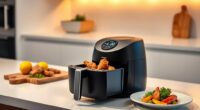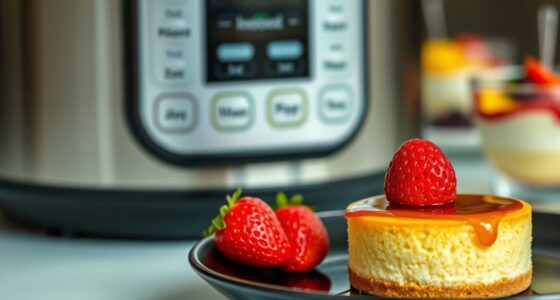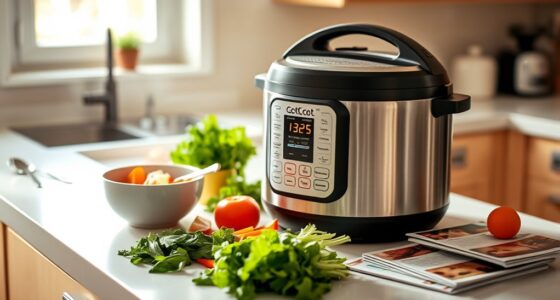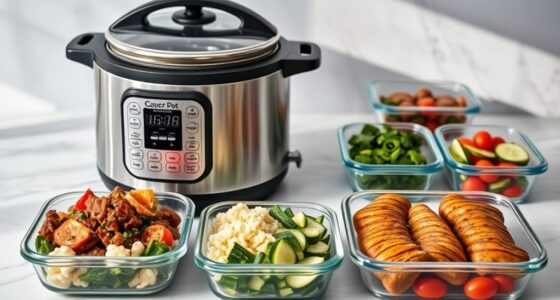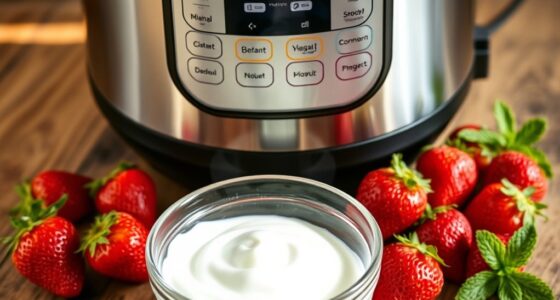Multicookers are highly worthwhile if you want to save space, time, and energy in your kitchen. They let you prepare a variety of dishes with one device, reducing clutter and streamlining meal prep. While they may take some time to master and require effort to keep clean, their versatility and efficiency make them a smart choice for busy households. Want to discover how to maximize their benefits? Keep exploring to learn more.
Key Takeaways
- Multicookers save space and reduce clutter by replacing multiple kitchen appliances, maximizing efficiency in small kitchens.
- They offer versatile cooking options, making meal prep easier and more convenient for a variety of recipes.
- While they streamline cooking, mastering their functions can require a learning curve and may involve challenging cleaning.
- Energy-efficient models lower power consumption compared to traditional ovens or stovetops, reducing utility costs.
- Overall, they are worth it for those seeking multifunctionality and space-saving solutions, despite some operational complexities.
Advantages of Multicookers
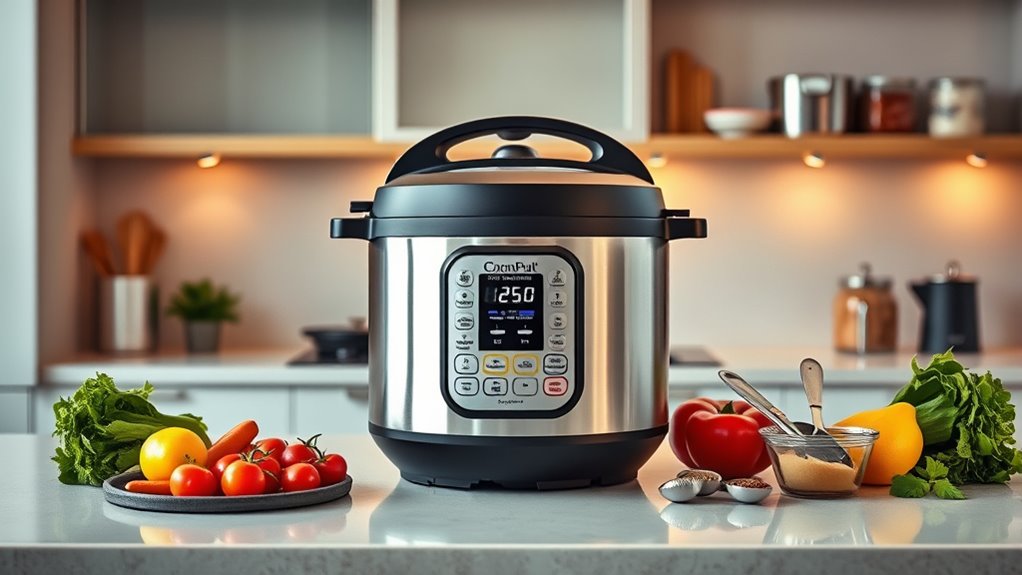
Multicookers offer several practical advantages that can make your kitchen more efficient. One major benefit is recipe convenience; you can prepare a variety of dishes with just one appliance, saving time and reducing clutter. Whether you’re steaming, slow-cooking, or pressure-cooking, you don’t need multiple gadgets. Additionally, multicookers are energy-efficient, using less power compared to traditional ovens or stovetops. They heat up quickly and maintain consistent temperatures, which helps cut down on electricity bills. This versatility allows you to experiment with different recipes without investing in multiple appliances. Overall, multicookers streamline meal prep, save energy, and give you more flexibility in the kitchen, making them a smart addition for busy households seeking efficiency. Incorporating raw food preparation options can further diversify your meal choices and promote healthier eating habits.
Potential Drawbacks to Consider
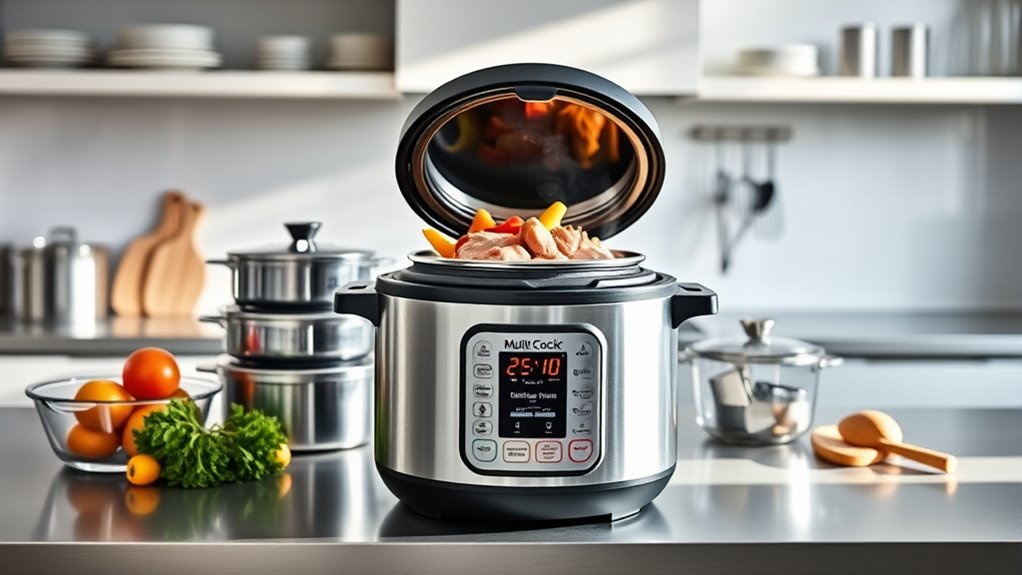
While multicookers offer many benefits, they also come with some potential drawbacks. One challenge is the learning curve; mastering different functions and settings takes time and patience. Additionally, cleaning can be tricky—removable parts may be difficult to wash thoroughly, leading to buildup or odors. Some models also have complex functionalities, which can add to the difficulty of operation and maintenance. Cleaning can be tricky—removable parts may be difficult to wash thoroughly, leading to buildup or odors.
Maximizing Space and Efficiency
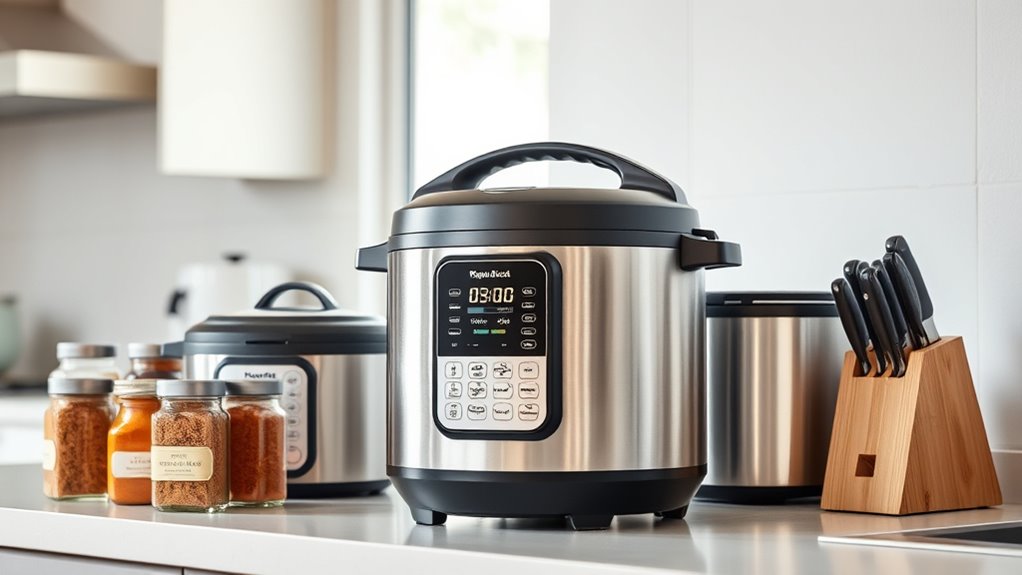
To make the most of your kitchen space and enhance efficiency, choose a multicooker with a compact design that fits seamlessly into your existing setup. A smaller footprint helps you maximize counter or storage space, making your kitchen feel less cluttered. Look for models that offer compact storage options, such as stackable components or foldable accessories, to keep your space organized. Additionally, prioritize energy efficiency—many multicookers consume less power than traditional appliances, saving you money and reducing energy waste. Using a versatile device that combines multiple functions reduces the need for several appliances, freeing up space and simplifying your cooking routine. Incorporating a space-saving design can further enhance your kitchen’s layout and usability. By selecting an efficient, space-saving multicooker, you optimize your kitchen’s functionality without sacrificing convenience.
Frequently Asked Questions
How Energy-Efficient Are Multicookers Compared to Traditional Appliances?
Multicookers tend to use less energy than traditional appliances because they cook faster and retain heat better. Their energy consumption is generally lower, which reduces your environmental impact. Plus, you save electricity, making them more eco-friendly and cost-effective over time. By combining functions into one device, you also reduce energy waste and streamline your kitchen, making multicookers a smart choice for efficient and sustainable cooking.
Are Multicookers Suitable for All Types of Recipes?
When it comes to recipe versatility, multicookers can be a double-edged sword. They handle many dishes well, but they’re not a one-size-fits-all solution. You might find some cooking limitations, especially with delicate baked goods or complex sauces. Still, for everyday meals, they’re a true workhorse. If you’re willing to adapt your recipes slightly, a multicooker can be a valuable addition to your kitchen arsenal.
What Safety Features Do Modern Multicookers Include?
Modern multicookers come equipped with essential safety features like safety mechanisms and overheating protection. These features automatically shut off or lock the lid if there’s a malfunction or excessive heat, preventing accidents. You’ll also find pressure release valves and cool-touch exteriors, making them safer to use. These safety mechanisms give you peace of mind, ensuring you can focus on cooking without worrying about potential hazards.
Can Multicookers Replace All My Kitchen Appliances?
You might wonder if a multicooker can replace all your kitchen appliances. While it offers great appliance versatility and helps maintain your kitchen aesthetics by reducing clutter, it can’t do everything. For example, you still need a blender or toaster. Multicookers excel at many tasks but are best as a supplemental tool rather than a complete substitute, helping you save space without sacrificing functionality.
How Long Do Multicookers Typically Last With Regular Use?
Multicookers typically last around 3 to 5 years with regular use, depending on quality and maintenance. To maximize durability lifespan, follow maintenance tips like cleaning the inner pot and sealing ring regularly, avoiding overloading, and using it according to manufacturer instructions. Proper care helps prevent damage and ensures your multicooker performs well for years, making it a dependable addition to your kitchen.
Conclusion
In the end, a multicooker is like a trusty Swiss Army knife in your kitchen—compact, versatile, and ready for any culinary challenge. While it can save space and streamline meal prep, it’s not without quirks that might slow you down. Weigh the pros and cons like balancing a scale, and you’ll find this gadget can be a shining star in your culinary universe—bright, efficient, and perfectly suited to your busy lifestyle.

